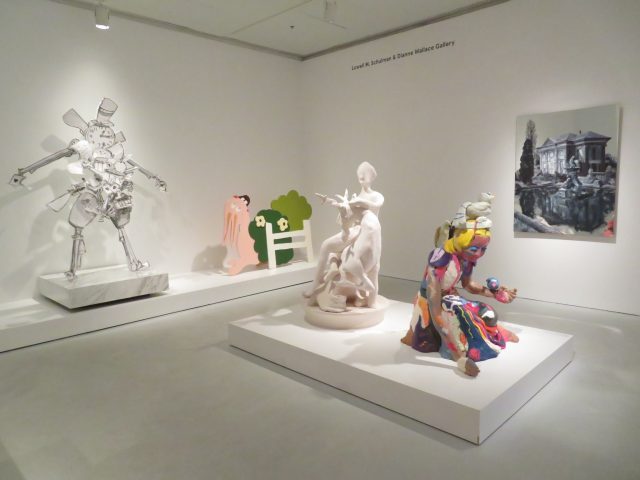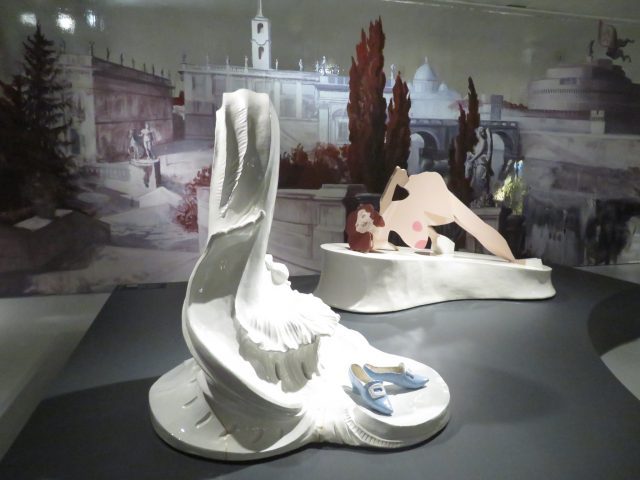
Rachel Feinstein will discuss her survey exhibition at the Jewish Museum on February 13 (photo by twi-ny/mdr)
The Jewish Museum, Scheuer Auditorium
1109 Fifth Ave. at 92nd St.
Thursday, February 13, $12-$18, 6:30
Exhibit continues through March 22, $8-$18, pay-what-you-wish Thursday from 5:00 – 8:00, free Saturday
212-423-3200
thejewishmuseum.org
Rachel Feinstein’s first survey exhibition, “Maiden, Mother, Crone” at the Jewish Museum, leads visitors down the Arizona-born, New York City-based multidisciplinary artist’s unique rabbit hole, an abstract wonderland where mythology, fairy tales, religious iconography, sexuality, and family are interwoven through a distinctly feminist lens. Mirrors figure prominently, allowing us to take a close look at ourselves and our innate biases. In conjunction with the show, Feinstein will give the Gertrude and David Fogelson Lecture at the museum on February 13, followed by a book signing of the companion monograph. The exhibit is fashioned like a fantastical trip though winding pathways with life-size statues, maquettes, paintings, film, and installation that are not always what they initially seem. A former fashion model who studied at Columbia, Feinstein creates works layered with nuance and filled with little surprises.
Model, a wood, plaster, and enamel paint construction with mirrors, is flanked by St. Sebastian and St. Michael, equating pop culture and religion. One room features Goldstein, a white-painted, carefully carved wood wall that evokes a tropical getaway, while another offers Panorama of Rome, Mylar wallpaper of Ancient Roman architecture surrounding such classical-inspired statuary as Corinne, a swirling Majolica piece made with the Nymphenburg Porcelain Manufactory and based on an eighteenth-century Commedia dell’Arte figurine; The Orphan and Bleeding Shepherdess, which subvert convention with frank images of the female body and its functions; and Butterfly and Puritan’s Delight, which play with fairy-tale tropes.

Rachel Feinstein’s fantastical fairy-tale world will be on view at the Jewish Museum through March 22 (photo by twi-ny/mdr)
Also on view are the stained wood Adam and Eve, which intertwines the biblical couple with nature in the Garden of Eden; a yearning depiction of the Crucifixion, Feinstein’s first work after having witnessed the destruction on 9/11 from her downtown apartment; the colorful Flower Girl, a Play-Doh-like youth with animals congregating all over her; Mr. Time, a fanciful black-and-white working clock based on a drawing by Feinstein’s son when he was ten; and a series of six cameo-like paintings of women on oval mirrors, five elderly ladies and a younger prima ballerina.
The inherent tension in Feinstein’s oeuvre, involving color, materials, and meaning in a kind of twisting of Hans Christian Andersen and Lewis Carroll, is also evident in her 1994-96 experimental short film Spring and Winter, in which she reconfigures Charles Perrault’s Sleeping Beauty story with an eye to the source material, Giambattista Basile’s Sun, Moon, and Talia, which was not so child friendly, as well as the true story of Art and Nan Kellam, a couple who lived in isolation on an island off the coast of Maine; in the film, Feinstein portrays a paper doll, a maiden, and a crone. There’s a theatricality to virtually everything Feinstein creates; in fact, her 2014 Folly installation in Madison Square Park was accompanied by a performance festival. “Maiden, Mother, Crone” continues through March 22; on March 12 ($18, 6:30), the panel discussion “Dialogue and Discourse — Once Upon a Time: Narrative in Art” features Feinstein with Lisa Yuskavage, Sofia Coppola, Tamara Jenkins, and Florence Welch, moderated by curator Kelly Taxter, and there will be such special gallery talks as “Mirrors of Civilization” and “The Dark Side of Fairy Tales” as well as Thursday Evening Cocktails through February, where attendees can try Feinstein’s potent potable of choice, the Negroni, an Italian favorite consisting of gin, vermouth rosso, and Campari.